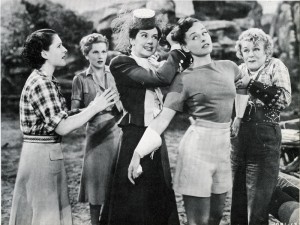The Women was also a breakthrough film for the young Joan Fontaine.
Photo: Fontaine is second, from left to right
Fontaine’s career as a leading lady at RKO had not been successful, and she was terribly insecure about her acting. Cukor’s direction gave her the confidence she lacked. “This film was a turning point,” Fontaine said, “It was the first time I had a director who showed me that acting was not standing in front of a camera reading lines. Up to that point, directors had not bothered.”
“The magic words of acting,” Cukor told Fontaine, “are, ‘think and feel,’ the rest will take care of itself.” She maintained that Cukor’s simple advice is the nucleus of acting, and the best advice any actor, male or female, can get. “We just rehearsed a scene and shot it,” Fonatine said about Cukor’s technique, “We didn’t do any intellectualizing. George was against Method Acting, because it kills the spontaneity and emotion of the role.”
Cukor’s aversion to Stanislavsky (and later Lee Strasberg’s Method) was known from his stage days. A famous story circulated of how Dorothy Gish asked Cukor during rehearsals for Young Love to explain her motivation for crossing the stage. “Just motivate your ass over there and sit in that chair,” Cukor told her.
Fontaine recalled Cukor’s habit of standing behind the camera, acting a scene as it was being shot: “He moved as if his whole soul was reaching out to you to call the performance from you.” Cukor’s distinctive talent was empathy–his actors believed he cared about their work. Kindness, humor and wit were tools Cukor used to finesse consistently strong, often surprising performances from his stars. “He wasn’t a marshmallow by any means,” Fontaine quickly added, “he could be caustic, but he did all to help you do the best job.”
“George could do no wrong to me,” said the actress. “I wish we had more directors like him today. I have missed Mr. Cukor in every piece of work I have ever done. I just wish he were there to show me the way and help me. I don’t know what he did for other people, but I felt he was my God. I felt total empathy and sympathy from him.” Fontaine had the most sentimental scene in the movie, when she reconciles with her husband on the telephone. Though small, this role had a great deal to do with Fontaine’s getting the lead in Hitchcock’s Rebecca, which later won the 1940 Best picture Oscar. “George recommended me for the part,” Fontaine noted, “I’m sure David Selznick called him up and said, ‘what’s this woman like, and George probably was very favorable.”
While Cukor was preparing Philadelphia Story, Selznick was testing actresses for Hitchcock’s upcoming Rebecca. Vivien Leigh and Lawrence Olivier tested together for Rebecca, but as much as Cukor liked the duo, his reaction to their test was not favorable. Still trusting Cukor’s casting savvy, Selznick asked for his opinion on the finalists: Anne Baxter, Margaret Sullivan, and the feuding sisters, Olivia De Havilland and Joan Fontaine. Cukor recommended Fontaine on the strength of her breakthrough in The Women. Hitchcock was of the same opinion, and Fontaine landed the role, for which she received her first Oscar nomination.











